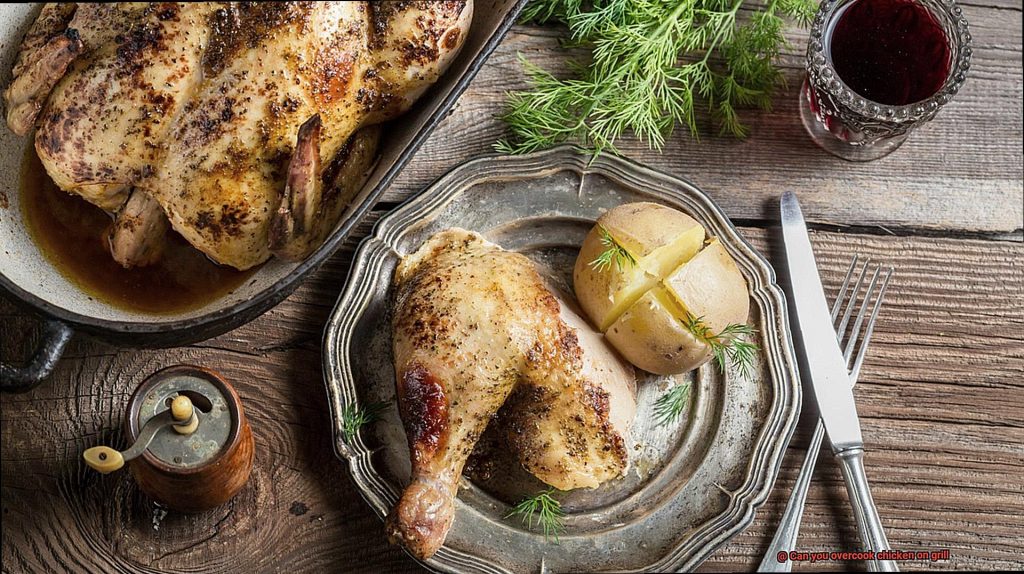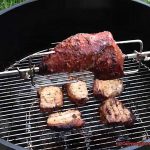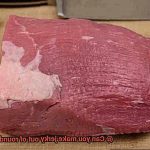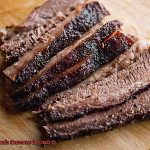Are you a grilling enthusiast who loves to cook chicken, but always ends up with dry and rubbery meat? Don’t worry, it’s a common problem that many people face. Grilling chicken to perfection can be challenging, especially if you’re new to it. One question that often comes up while grilling chicken is whether or not it’s possible to overcook it. So, can you overcook chicken on the grill?
The answer is a resounding yes. Just like any other meat, chicken can be overcooked on the grill. Overcooking your chicken will not only make it dry and tough, but it can also be harmful to your health. When chicken is overcooked on the grill, it can have a burnt and carcinogenic taste that increases your risk of cancer and other health issues.
Grilling chicken requires precision in time and temperature control. Cooking it for too long or at high temperatures can quickly turn your juicy chicken into a disaster. The key is to ensure that the internal temperature of the chicken reaches 165°F without overcooking it.
But don’t fret. In this article, we’ll dive deeper into the art of grilling chicken and answer some burning questions that will help you get perfectly grilled chicken every time. So stick around and learn how to avoid overcooking your chicken on the grill like a pro.
Contents
What Is the Ideal Temperature for Grilling Chicken?
Grilling chicken is a beloved cooking method that can result in mouthwatering meals, but achieving the perfect temperature can be tricky. To ensure that the chicken is cooked thoroughly and safely, it’s crucial to maintain the ideal internal temperature.
The recommended temperature for grilling chicken is around 165°F (74°C). This temperature ensures that harmful bacteria are eliminated and the meat is fully cooked without drying out. To achieve this temperature, it’s best to grill the chicken at a medium heat level of about 350°F (177°C).
Using a meat thermometer is an excellent way to check whether the chicken has reached the ideal temperature. Insert the thermometer into the thickest part of the chicken, away from any bones, and wait until the reading stabilizes. Once the chicken has reached 165°F, it’s time to take it off the grill.
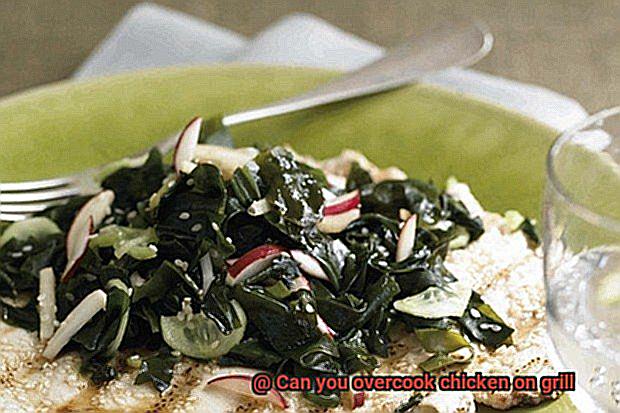
Overcooking can ruin even the most delicious chicken. It’s important to avoid overcooking by removing the chicken from the grill once it reaches the ideal temperature and allowing it to rest for a few minutes before cutting into it. This allows the juices to redistribute throughout the meat, resulting in tender and flavorful chicken.
Marinating your chicken prior to grilling can also help keep it juicy and tender. Additionally, keeping the grill temperature consistent and avoiding cooking over high flames can prevent overcooking and potentially harmful compounds called HCAs from forming.
The Dangers of Overcooking Chicken on the Grill
Grilling chicken is a delicious and satisfying culinary experience that requires proper technique and precision. However, overcooking chicken on the grill can result in serious health hazards that must be avoided at all costs.
One of the most significant dangers of overcooking chicken on the grill is the risk of contracting foodborne illnesses. Overcooked chicken becomes dry and tough, making it difficult to digest and leading to stomach problems and other health issues. To avoid this, it is crucial to ensure that the internal temperature of the chicken reaches 165°F (74°C) by using a meat thermometer.
Apart from health concerns, overcooked chicken can taste unpleasant and ruin the entire grilling experience. Overcooking causes the chicken to lose its natural juices and flavor, resulting in a dull and unappetizing dish. Marinating the chicken beforehand helps lock in moisture and enhance its flavor, ensuring that it remains juicy and delicious.
Wasting food and money is another danger associated with overcooking chicken on the grill. Spending time marinating and seasoning your chicken only to have it turn out dry and flavorless can be frustrating and disappointing. Additionally, throwing away overcooked chicken wastes both food and money that could have been spent on something else.
To avoid these risks, follow these simple tips: use a meat thermometer to check the temperature of your chicken, marinate your chicken beforehand to enhance its flavor and lock in moisture, and avoid high flames that can cause uneven cooking. By doing so, you’ll be able to enjoy delicious and safe grilled chicken every time.
How to Avoid Overcooking Chicken on the Grill
Grilling chicken is a favorite pastime for many during the summer season. However, overcooking the chicken on the grill can be a common mistake that can ruin the taste and texture of the meat. Moreover, it can pose a serious health risk if the chicken is not cooked thoroughly. In this post, we will discuss five useful tips to avoid overcooking chicken on the grill.
Tip #1: Proper Preparation of Chicken
Preparing the chicken properly before grilling is crucial. Trim any excess fat and remove the skin as these can cause flare-ups and uneven cooking. Additionally, marinating the chicken for a few hours before grilling can help keep it moist and prevent it from drying out.
Tip #2: Use Indirect Heat to Avoid Overcooking
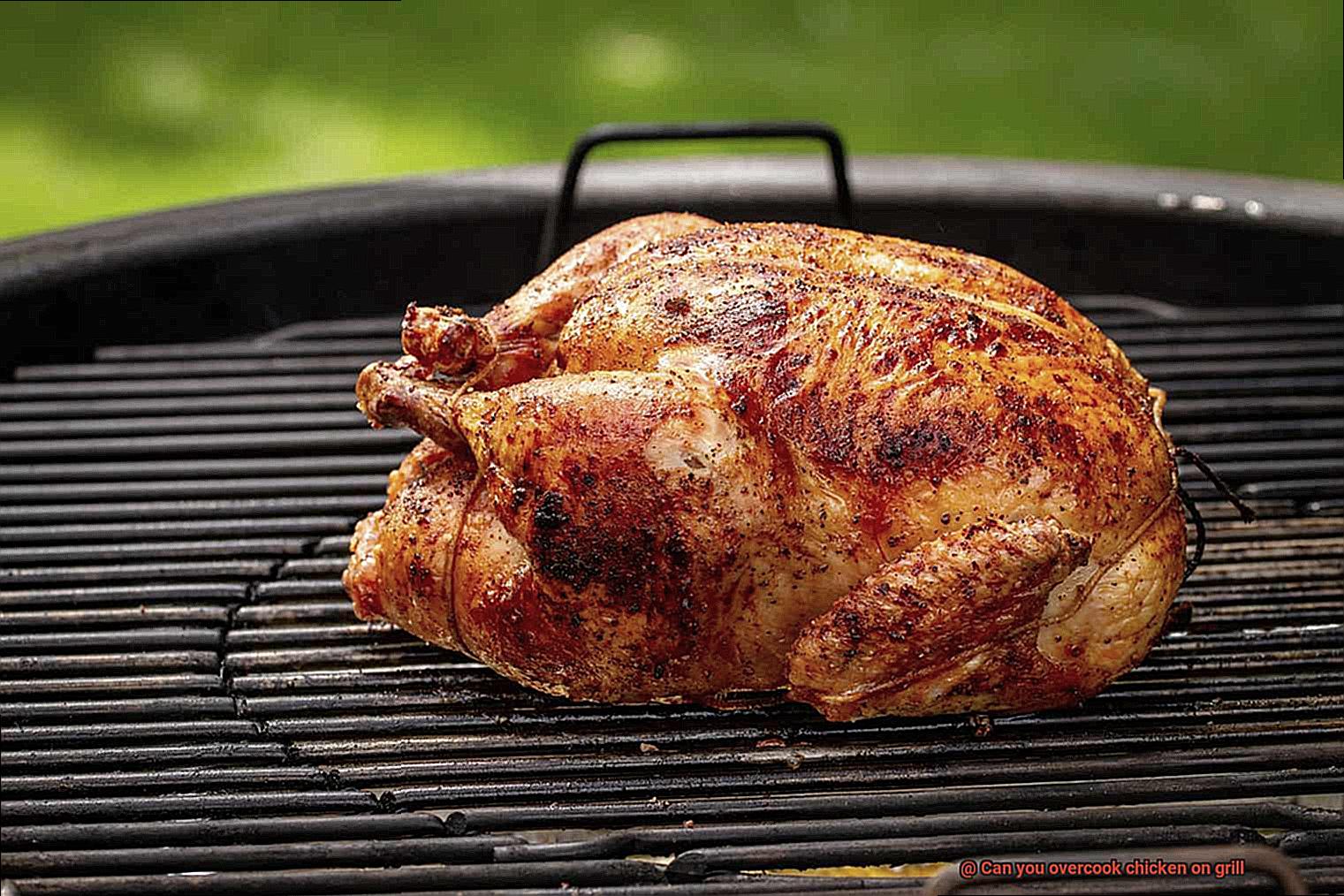
Using indirect heat is an effective way to avoid overcooking. Place the chicken on a cooler part of the grill and close the lid, allowing it to cook slowly and evenly. This method will prevent the chicken from drying out and ensure that it’s safe to eat.
Tip #3: Monitor Internal Temperature
Checking the internal temperature of the chicken using a meat thermometer is important. The USDA recommends cooking chicken to an internal temperature of 165°F (74°C) to eliminate harmful bacteria. By using a thermometer, you can ensure that the chicken is cooked thoroughly without being overcooked.
Tip #4: Avoid Constant Flipping
Constant flipping of chicken while grilling can lead to dry and tough meat, as well as increase flare-ups risk. Instead, allow the chicken to cook for a few minutes on one side before flipping it once and allowing it to cook on the other side until it reaches the desired internal temperature.
Tip #5: Keep an Eye on Cooking Time
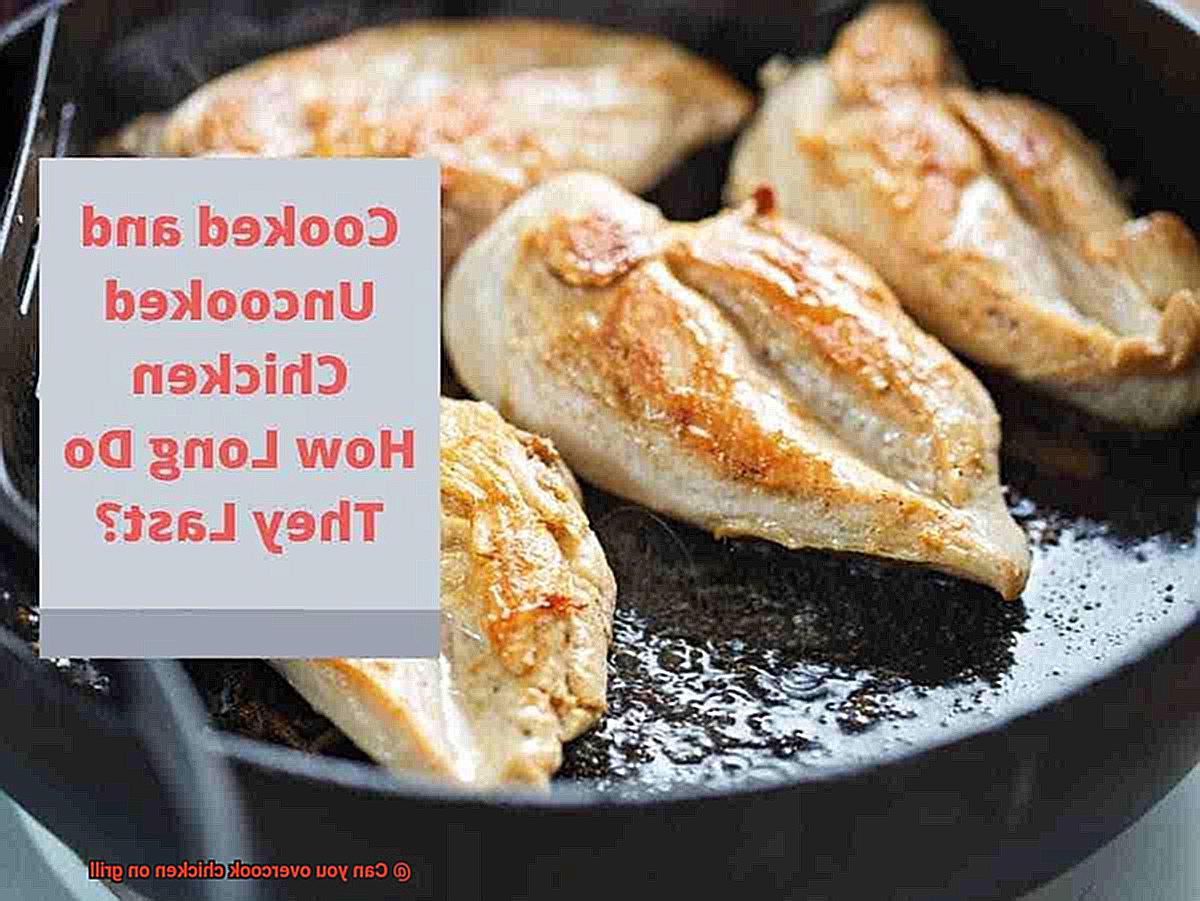
It’s essential to keep track of your cooking time while grilling chicken. It’s easy to get distracted while grilling, so set a timer or watch the clock so that you do not forget about your chicken and end up with overcooked meat.
Benefits of Marinating Before Grilling
Marinating is a process that involves soaking meat in a mixture of herbs, spices, and acidic liquids like vinegar or citrus juice. But marinating isn’t just about adding flavor – it has many benefits that will take your grilled chicken to the next level.
One of the most significant benefits of marinating your chicken before grilling is that it adds incredible flavor to the meat. The longer you marinate the chicken, the more intense the flavor becomes. The acidic ingredients in the marinade break down the protein in the meat, allowing the flavors to penetrate deep into the chicken. Whether you prefer a classic lemon herb marinade or something more adventurous like a spicy Caribbean jerk marinade, marinating your chicken will take it from bland to delicious.
But flavor isn’t the only benefit of marinating. Another major advantage is that it helps to tenderize the meat. The acids in the marinade break down the muscle fibers in the meat, making it easier to chew and enjoy. This is especially important when grilling tougher cuts of chicken like breasts or thighs, which can be dry and tough without proper preparation.
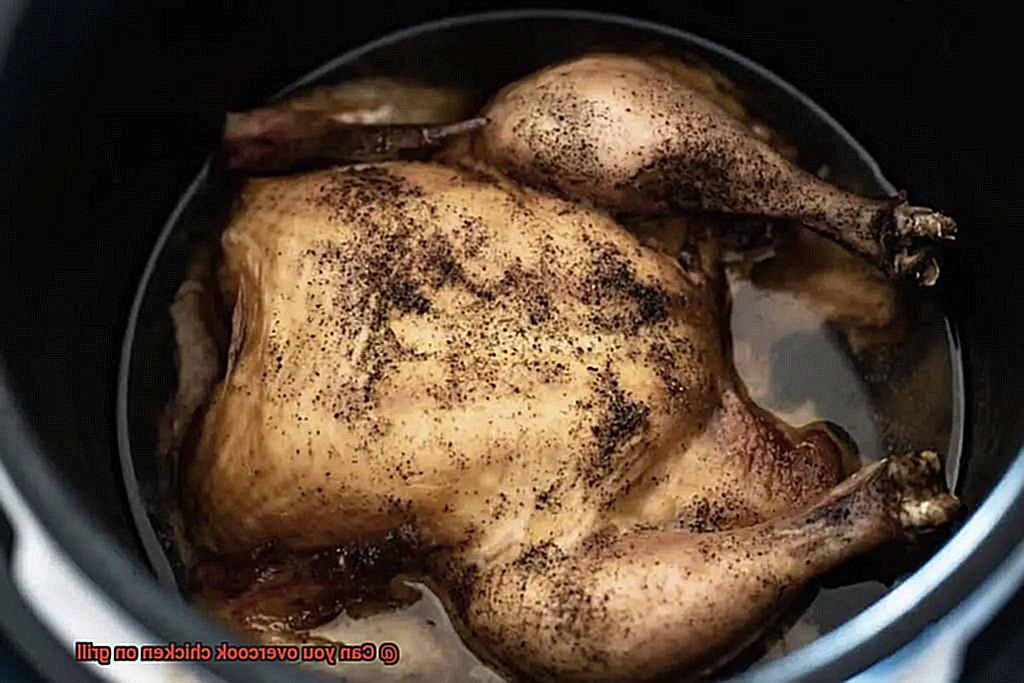
In addition to tenderizing the meat, marinating also helps to prevent the chicken from drying out on the grill. The moisture from the marinade keeps the meat juicy and flavorful while it cooks. This is particularly important for boneless, skinless chicken breasts, which are notorious for drying out quickly if not properly marinated.
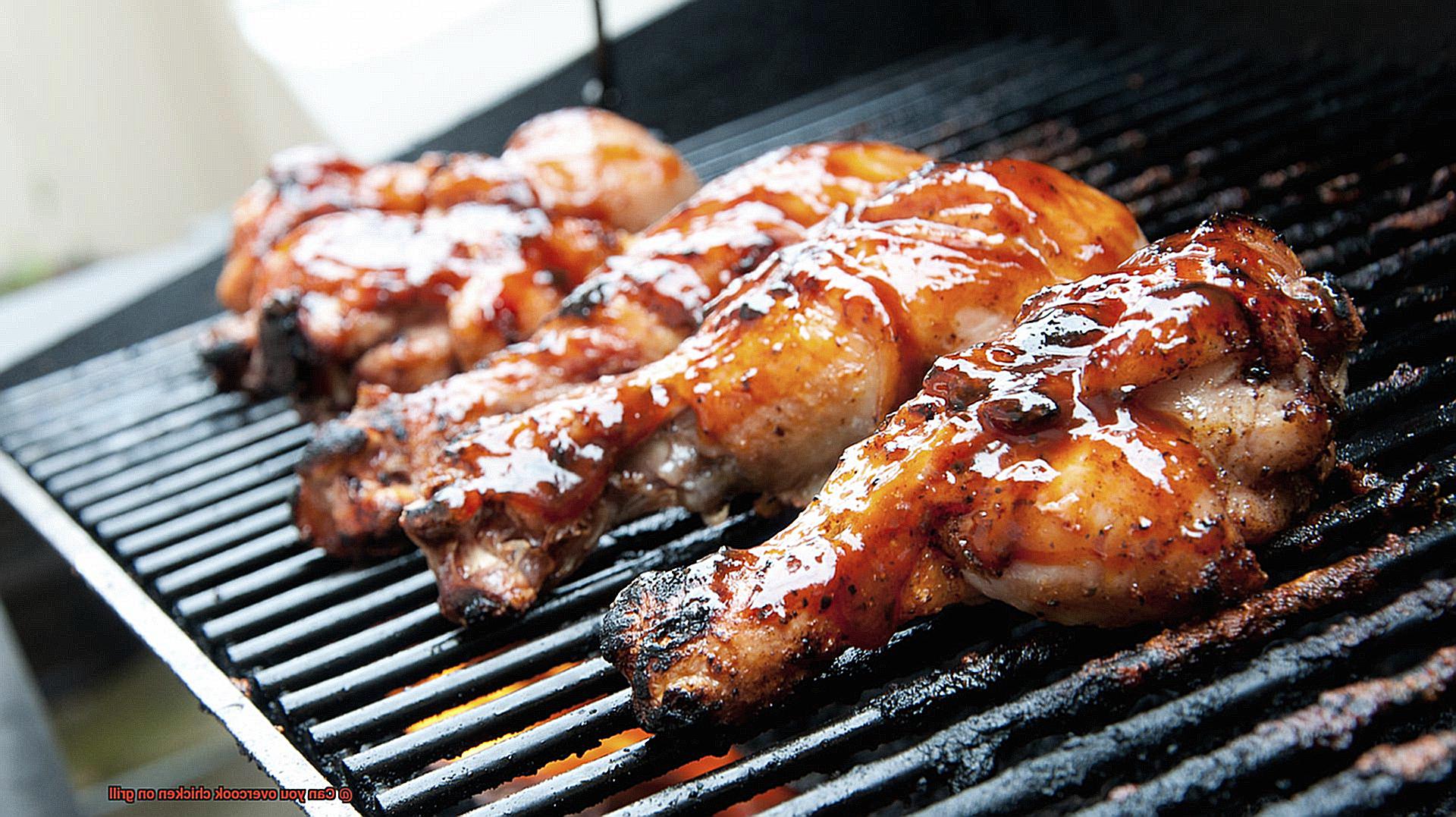
So what are some tips for successful marinating? First off, make sure to give yourself enough time – at least 30 minutes to an hour for small cuts and up to 24 hours for larger cuts. Additionally, don’t be afraid to experiment with different flavors and ingredients – from sweet and savory marinades to spicy and tangy ones, the options are endless. Finally, make sure to properly prepare and store your meat before and after marinating to ensure food safety.
Tips for Cooking Juicy, Delicious Chicken on the Grill
Grilling chicken can be a challenging task, as it is easy to overcook the meat and end up with dry and tough chicken. However, with a little bit of preparation and attention to detail, you can cook juicy and delicious chicken on the grill every time. Here are some tips to help you achieve perfectly cooked chicken:
Start with high-quality chicken
The quality of the chicken you use is crucial to the final outcome of your grilled dish. Look for plump and moist chicken breasts with no signs of discoloration or dryness. Buying organic or free-range chicken can enhance the flavor and tenderness of your meat.
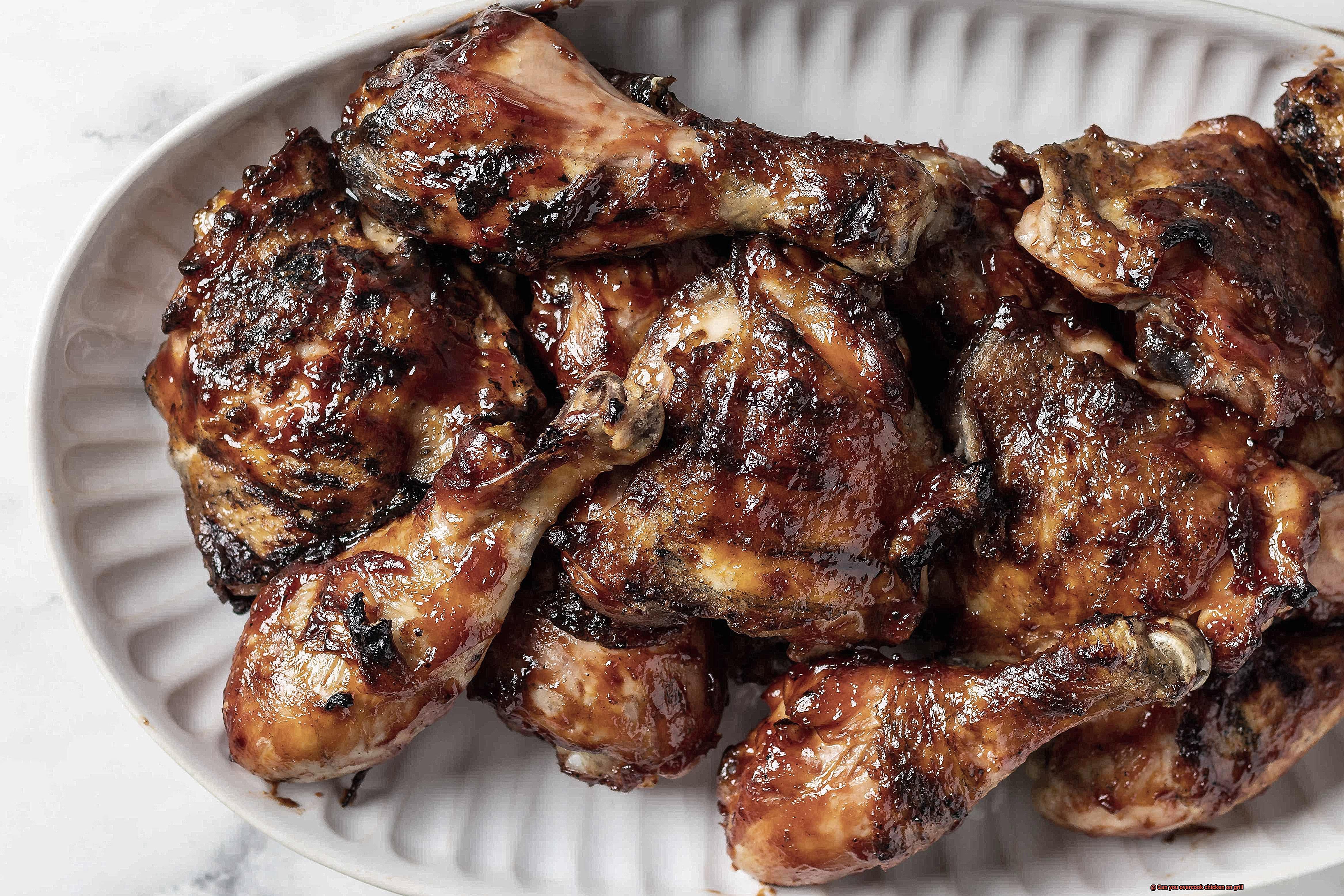
Season your chicken
While seasoning your chicken can add flavor to the meat, it’s important not to overpower its natural taste. A simple marinade of olive oil, lemon juice, garlic, and herbs can do wonders for your chicken. Letting your chicken marinate for at least an hour before grilling allows the flavors to seep into the meat.
Preheat your grill
To ensure even cooking, preheat your grill to medium-high heat (around 375-400 degrees Fahrenheit). Brushing the grates with oil will prevent your chicken from sticking.
Cook using indirect heat
Using indirect heat while grilling can help retain moisture in your chicken and prevent it from drying out. Place the chicken on a cooler part of the grill and cook it slowly over a longer period of time.
Use a meat thermometer
Overcooking your chicken is a common mistake that can ruin your dish. To avoid this, use a meat thermometer to check for doneness. The recommended internal temperature for cooked chicken is 165°F (74°C).
Different Types of Grills and Their Effects on Cooking Time
Grilling chicken is a popular way to cook this versatile meat, and the type of grill you use can greatly impact the cooking time and potential for overcooking. Let’s explore the different types of grills and their effects on cooking time when it comes to grilling chicken.
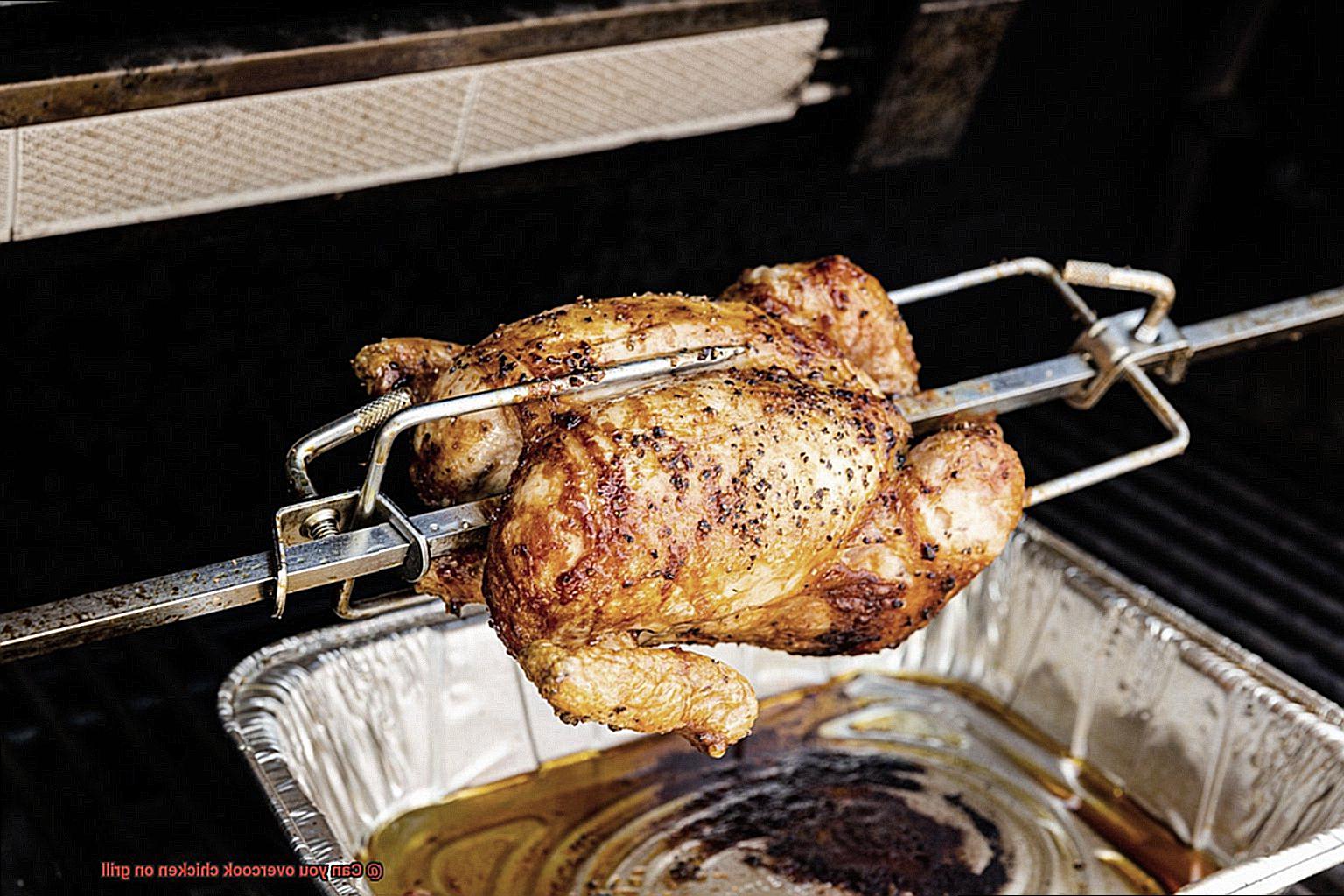
Gas grills are a common choice for outdoor cooking due to their convenience and quick heating time. However, they can also lead to overcooking if not monitored closely. Gas grills usually have multiple burners, allowing for different heat zones and the ability to adjust the temperature as needed. It’s important to use the correct heat zone for the chicken being grilled to avoid overcooking. For example, thicker cuts of chicken should be cooked on a lower heat setting to ensure they cook through without burning on the outside.
On the other hand, charcoal grills offer a distinct smoky flavor to chicken that many people enjoy. However, they can take longer to heat up than gas grills and can be more difficult to control temperature-wise. It’s important to create different heat zones by moving the coals around, which can help prevent overcooking by allowing for areas of higher and lower heat. Monitoring your chicken closely is crucial when cooking on a charcoal grill to avoid overcooking.
Electric grills are another option, particularly for those who live in apartments or other areas where traditional outdoor grilling is not allowed. Electric grills offer the convenience of indoor use and precise temperature control, but they may not provide the same flavor as gas or charcoal grills. Electric grills typically have adjustable temperature settings that can help prevent overcooking by allowing for precise control of the cooking temperature.
To avoid overcooking chicken on any type of grill, it’s crucial to monitor the internal temperature of the meat using a thermometer. The ideal temperature for grilling chicken is between 165°F and 175°F. Anything above this temperature can result in overcooked chicken. Additionally, marinating the chicken before grilling can help keep it moist and tender.
Common Mistakes to Avoid When Grilling Chicken
Grilling chicken can be a delicious and healthy way to enjoy a summer meal, but it can also be a tricky process. Overcooking chicken can lead to tough, dry, and unappetizing meat. As an expert in grilling chicken, I have researched and compiled a list of common mistakes that people make when grilling chicken.
One of the most common mistakes is not properly preparing the chicken before grilling. This includes not marinating the chicken or not seasoning it with enough spices and herbs. A lack of seasoning can lead to bland-tasting chicken, which may cause some people to overcook it in an attempt to add more flavor. So, take the time to marinate your chicken for at least 30 minutes before grilling and season it generously with your favorite herbs and spices.
Another mistake is cooking chicken on too high of heat. Although high heat may seem like a good idea to ensure your chicken is cooked thoroughly, it can actually cause the outside of the chicken to burn while the inside remains undercooked. It’s best to cook chicken on medium heat and check the temperature frequently using a meat thermometer.
Cutting into the chicken too soon is also a mistake that can lead to dry and tough meat. When you cut into the chicken too soon, you release all of its juices and moisture, which can cause it to become dry and tough. Therefore, let the chicken rest for at least 5-10 minutes before cutting into it.
Lastly, not using a meat thermometer is one of the most common mistakes when grilling chicken. Without a meat thermometer, it’s difficult to know when the chicken is fully cooked, which can lead to overcooking or undercooking. A good quality meat thermometer is essential for perfectly cooked grilled chicken every time.

To summarize, here are some common mistakes to avoid when grilling chicken:
- Not properly preparing the chicken before grilling
- Cooking on too high of heat
- Cutting into the chicken too soon
- Not using a meat thermometer
The Benefits of Using a Thermometer when Grilling
Using a thermometer when grilling chicken can be your saving grace in achieving the perfect juicy and flavorful chicken every time.
Let’s dive into the benefits of using a thermometer when grilling chicken:
Determine the exact temperature:
Using a thermometer helps you to determine the exact internal temperature of the meat, ensuring that it is cooked to perfection. Chicken needs to be cooked at a minimum internal temperature of 165°F (74°C) to be safe for consumption. A thermometer will help you achieve this, giving you peace of mind that your chicken is fully cooked and safe to eat.
Avoid undercooking or overcooking:
One of the most significant benefits of using a thermometer when grilling chicken is that it allows you to avoid undercooking or overcooking the meat. Overcooked chicken can become dry and tough, while undercooked chicken can be dangerous to consume. By using a thermometer, you can ensure that your chicken is cooked perfectly, resulting in juicy and delicious meat every time.
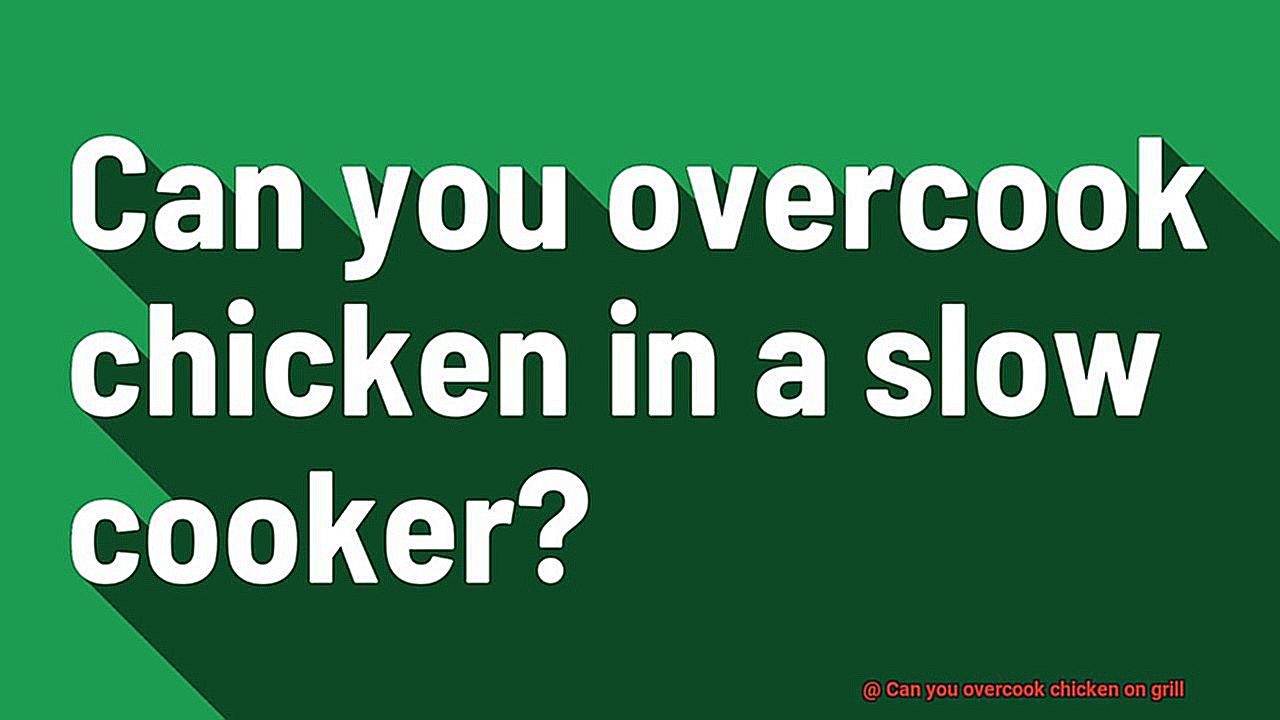
Eliminate guesswork:
Visual cues such as the color of the meat or the juices that come out when pierced with a fork can lead to inaccurate results. Using a thermometer takes the guesswork out of grilling and gives you an accurate reading of the internal temperature of the meat. This allows you to cook your chicken with confidence, knowing that it is safe and delicious.
Cook like a pro:
Investing in a good quality thermometer is an essential tool for any grill master. It helps you to cook your chicken to perfection, giving you restaurant-quality meat every time. Impress your family and friends with perfectly cooked chicken that is both safe and delicious.
NQz72eoM5W8″ >
Conclusion
To sum up, grilling chicken is a culinary art that requires precision and attention to detail. Overcooking chicken on the grill can be detrimental to both your health and taste buds. To avoid this, it’s essential to maintain an optimal temperature of around 165°F (74°C) by using a meat thermometer.
Proper preparation is key when it comes to preventing overcooked chicken. Trimming excess fat, marinating beforehand, using indirect heat, avoiding constant flipping, monitoring cooking time, and selecting high-quality cuts are all crucial steps in achieving the perfect grilled chicken.
Using a thermometer while grilling provides numerous benefits such as eliminating guesswork and cooking like a pro. It ensures that the meat reaches the desired temperature without undercooking or overcooking.
By following these tips and techniques for grilling chicken, you’ll be able to achieve succulent and flavorful results every time you fire up that grill.

